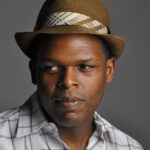In a story from 2021, Maurice Carlos Ruffin and Tad Bartlett hit the road in Louisiana to talk about — and then write about — the South’s future.
Maurice Carlos Ruffin and Tad Bartlett live in New Orleans. They have been close friends for more than 15 years. Their friendship began as writers' acquaintances, workshopping novels and short stories. Their friendship and their writing bond grew tighter over the years, as they weathered literal and metaphorical storms and celebrated personal triumphs together, while they also founded a writers' group, attended the same MFA program, and began publishing their work.
One constant has been their penchant for hitting the road together, traveling across the South for writing retreats, conferences, and readings. Four years ago, after the Robert E. Lee statue came down, they took a road trip to Tad's childhood town of Selma, Alabama, and then collaborated on a story in The Bitter Southerner, "Kings of the Confederate Road," exploring ways to redefine "heritage" in a changing South. Now, Chuck Reece has charged Maurice and Tad with a new collaboration, exploring what the South can look like moving forward. So, of course, Maurice and Tad decided to get in the car and hit the road, this time heading upriver from New Orleans on Louisiana's River Road.
Tad Bartlett: Maurice, my brother, I’m looking forward to taking a drive with you this weekend. Up the River Road. We’ll put the levee and the batture and the Mississippi River on our left and ride that two-lane as it winds upriver. Rolling by on our right will be old plantations housing ghosts of a mythical South, working-class neighborhoods that are remnants of old freedmen villages, and behemoth “cancer alley” petrochemical facilities that place new burdens on human bodies in the same space as the old whips and countless blood-crimes of exploitation.
But it will be a pretty day, autumn in the air, or at least what passes for autumn down here along the arch of the foot in Louisiana’s boot, and I’ll be happy to be taking a drive with you, my friend, sharing a less-than-socially-distanced space, breathing the same air, all these dangerously intimate things we took for granted until a year and a half ago.
Last time you and I road-tripped was in the final days before the world shut down in March 2020, driving home to New Orleans from a writers’ conference in San Antonio, when we could feel the panic spreading with the virus. And in all the time since then I’ve seen you in person, what, three times? Maybe four? A weekend stolen from the cautious world to visit you up in Oxford. A lunch. The night your second book came out. It’s not enough.
It’s not enough, particularly with everything else that has happened in the world in that time. Ahmaud Arbery. Breonna Taylor. George Floyd. And Daunte Wright, Andre Hill, Manuel Ellis, Rayshard Brooks, Daniel Prude, Ma’Khia Bryant, David McAtee, Dreasjon Reed, Michael Ramos. Too many people. And then the election, followed by the violence of the January 6 assault on the Capitol. And swirling around all of it, a miasma I can taste, a virus itself, the lies, lies to protect people against acknowledging their own evil, their complicity.
I’m going to have the windows rolled down while we drive. The wind is going to blow my graying hair into my face, but I’ll be careful not to collide with anyone, swerving only when the road swerves, which it does a lot, holding to the meanders of the River. And we’ll have music pumping, as we always do when we drive. And we’ll talk, talk about all of this, about this world, about this South, about us.
Maurice Carlos Ruffin: There’s a feeling I get when I’m jogging through a mostly white neighborhood. There’s a feeling I get when the clerk at a convenience store doesn’t like me. There’s a feeling I get when I’m sleeping in bed at night, snuggled up after having watched a movie and eaten popcorn. The racial waves in America crest and fall. We witnessed the largest protests in world history around the assassination of George Floyd. That kind of response can’t and won’t happen every year. History pulses on a frequency we can’t see because we’re inside of it. Ask an abolitionist in 1864 how they feel about the future of the nation. Or a Civil Rights Worker in 1964. Or Jesse Jackson on the night Barack Obama wins. Yes, we can be hopeful. But we tend to return to that earlier place, don’t we? We return to those lesser in-between moments.
But bro, it has been a minute since we really hung out and traveled the land together. You popped in and out of that book event so fast in October, I thought I imagined you. I don’t know what to expect from this trip. In the past, we’ve gone out to interview people or investigate a site. But this time we’re just rolling, aren’t we? We might find anything on this road.

Torn Up and Broken
TB: The drive was as nice as I’d hoped. The sky was a blue I haven’t seen since spring, before summer’s heat wilted the color out. But the reality of a drive like this is never what we expect when we look ahead to it. Now we’re on the other side, looking in our rear-view, trying to make sense of it.
What a strange and varied road we drove. We started out from your book-signing at the po’boy-and-plate-lunch/daiquiri bar/laundromat in town, passed along the quiet tree-lined avenue where slave pens once stood, headed through the tourist-choked French Quarter (it surprised me, all these folks out and about), picked up speed past the warehouses and wharves where once cotton bales and now containers of international goods load and unload, through the busy streets of uptown, then hit River Road at the Orleans/Jefferson Parish line. After that, we drove beside mainly working-class neighborhoods, with a very few ritzier enclaves scattered in, and quite a few more going the opposite direction on the economic spectrum.
All the while we talked around our charge — what does the South hold, as promise and as prophecy? We’re left in this space where we can either construct upon jagged ruins or just let time’s winds smooth out their contours until we can’t see any change around us.
The first plantation we passed was little more than a historic-site marker and a dirt track up to an iron fence with “Private Property. Keep Out” posted on it. The second plantation, once one of those that glorified the Old South, now sells multiple volumes of slave narratives in its gift shop and features a prominent display about the role of the plantation in the 1811 uprising — Charles Deslondes coordinating 500 enslaved people to revolt, marching toward New Orleans, torching plantation buildings and killing two plantation owners along the way, before being met by militia near present-day Kenner. Nearly 100 freedom fighters died in the fighting and subsequent summary trials, and their heads were mounted on pikes and displayed along nearly 60 miles of river levee.
The road we were driving would have been lined with their dead stares.
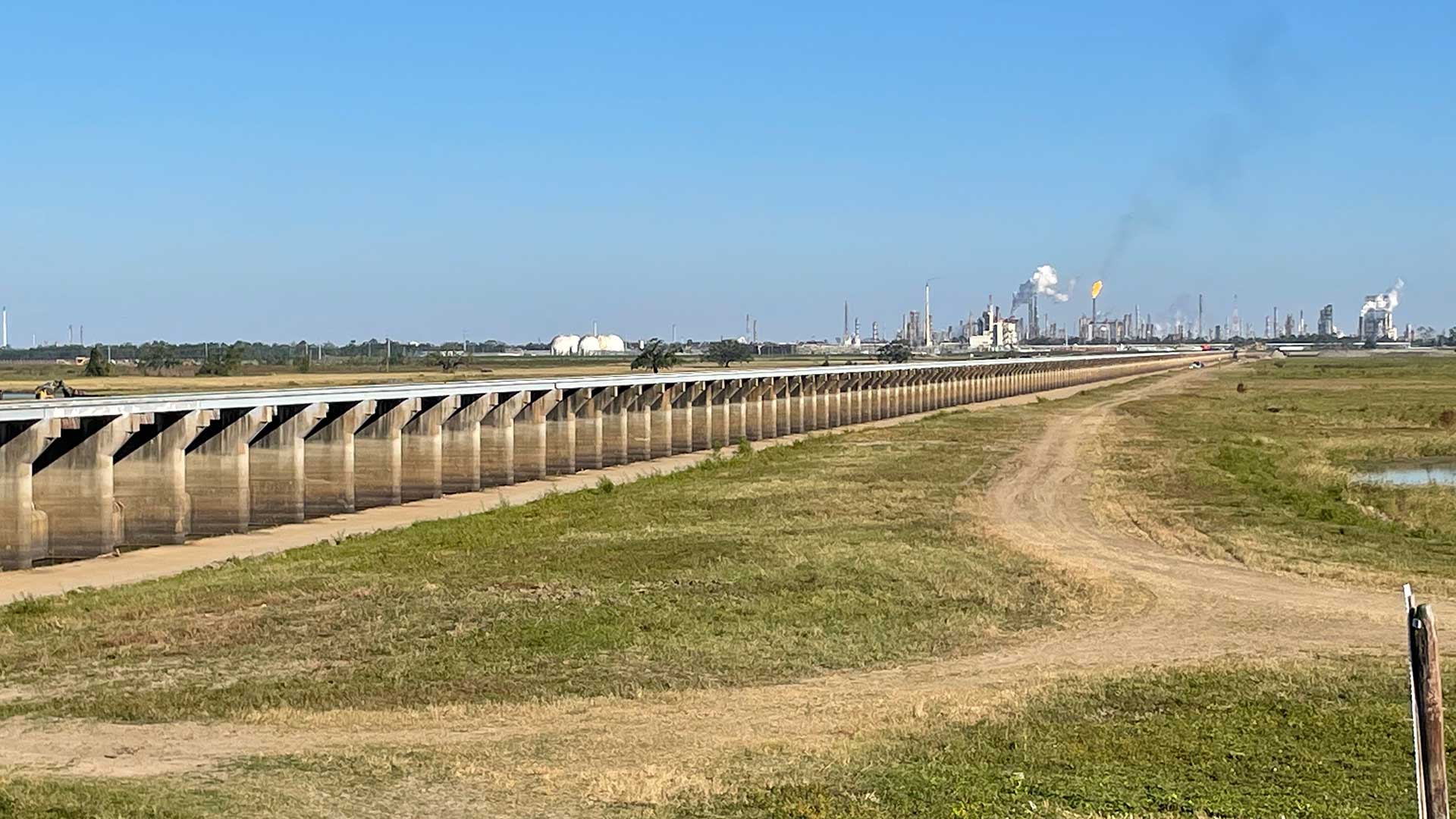
Then the giant flare, a flame shooting like a jet engine out of the stack, burning off toxins from the Shell refinery complex in Norco, just past the fence line communities near the downriver boundary of the facility. The facility itself is a tangle of pipes and tanks and steam and smoke. It smelled like burnt tin, heavy in the air, in our noses and throats and lungs through our open car windows. Just upriver from the facilities at Norco, the road rose over and dipped back down the other side of the levee into the vast plain of the Bonnet Carre Spillway, where the levee is replaced by a gate system more than a mile and a half long, designed to let the fattened spring river spill across marshland to Lake Pontchartrain.
We parked on the upriver edge of the spillway and got out and looked back across to Norco and its flare, and across the river at the equally menacing Union Carbide facility in Taft, Louisiana. (According to a ProPublica report released the week before our drive, the EPA classifies a 1-in-10,000 risk of cancer as “acceptable.” The area where we surveyed across the spillway comes at 1-in-4,200, 2.4 times the acceptable risk; and the area near LaPlace, where we turned back around, with its Denka neoprene plant and other facilities, is at 1-in-320, or 32 times the acceptable risk. And the communities in these risk areas are home to a disproportionate number of Black residents).
We kept going upriver and saw each community — each bundle of mobile homes and small houses — more torn up than the one before. Literally torn up. We were driving through the heart of the destruction left by the central eye wall of Hurricane Ida. Over three months ago, that storm is long gone from the national consciousness, just another name in the annual parade of storms, but there are still people sitting in front of shredded homes, looking dazed in the brilliant November blue-sky afternoon.
And all the while we talked around our charge — what does the South hold, as promise and as prophecy? You hit it right on the head when you wrote of our “lesser in-between moments.” The immediacy of the protests of two summers ago has faded. The fires of the election and of marauding, zip-tie-wielding, gallows-erecting, traitorous thugs are now just part of the political background noise of alternating truths and ho-hum outrage. The hurricanes have blown out. We’re left in this space where we can either construct upon jagged ruins or just let time’s winds smooth out their contours until we can’t see any change around us.
Already, with the pundits and talking heads blaming the outcome of November 2021’s elections on questions such as the ones you and I are thinking about and talking about — questions of how to address historic and ongoing, systemic wrongs, how to have conversations about racism, how to reconcile — we must now ponder the question, “Why?” Why have conversations about racism? What value or purpose is there in reconciliation? Why not just live in our self-defined realities and communities and cope?
Sometimes, Maurice, I feel broken. What a privilege it would be to give in to that brokenness.
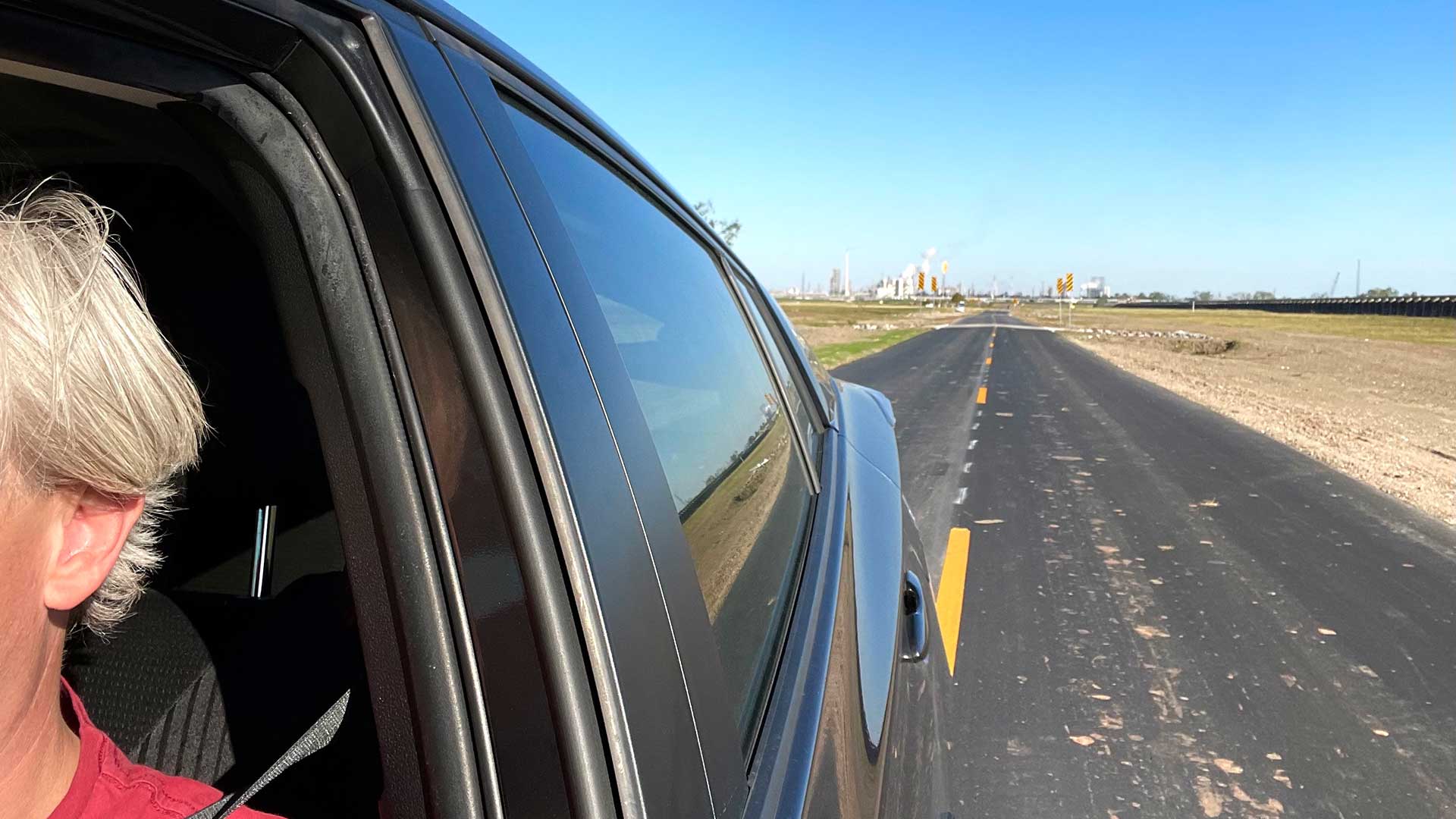
MR: I think often about how in the South we give with one hand while taking with the other. I use “we” advisedly. Riding past these ancient plantations, I know that slavery was a money grab above all. Each plantation had a family. Each family had a man. And all the efforts of the enslaved people and the white workers shoveled money into that man’s pockets. The enslaved people were allowed no ownership of property and made no money from their labor. Nothing to pass down the generations but their knowledge, assuming their family hadn’t already been sold off. The white workers had little money and little property, if any. But, I imagine, they were glad that they had their freedom, at least.
On modern River Road, I watch the smokestacks. I’ve known all my life that in Southeast Louisiana we live in Cancer Alley. The people who live in the closest towns — New Sarpy, Montz, LaPlace — are right under it all. Each one of these corporations has a plot of land. The wetworks convert materials into God knows what and a possible early death for anyone within range of the mist. The people who live nearby work in the plants or in service of the plants. They shovel money into the pockets of the shareholders and their families.
I understand that many of the locals who are Black live closest to the poisonous stacks. They aren’t enslaved, of course, but they get a lungful of death every day. The modern white workers live a few blocks farther from the smokestacks. And, perhaps, their lungs are a little less full of carcinogen. But that’s hardly a win. Just like working on a plantation as a free person was hardly a win.
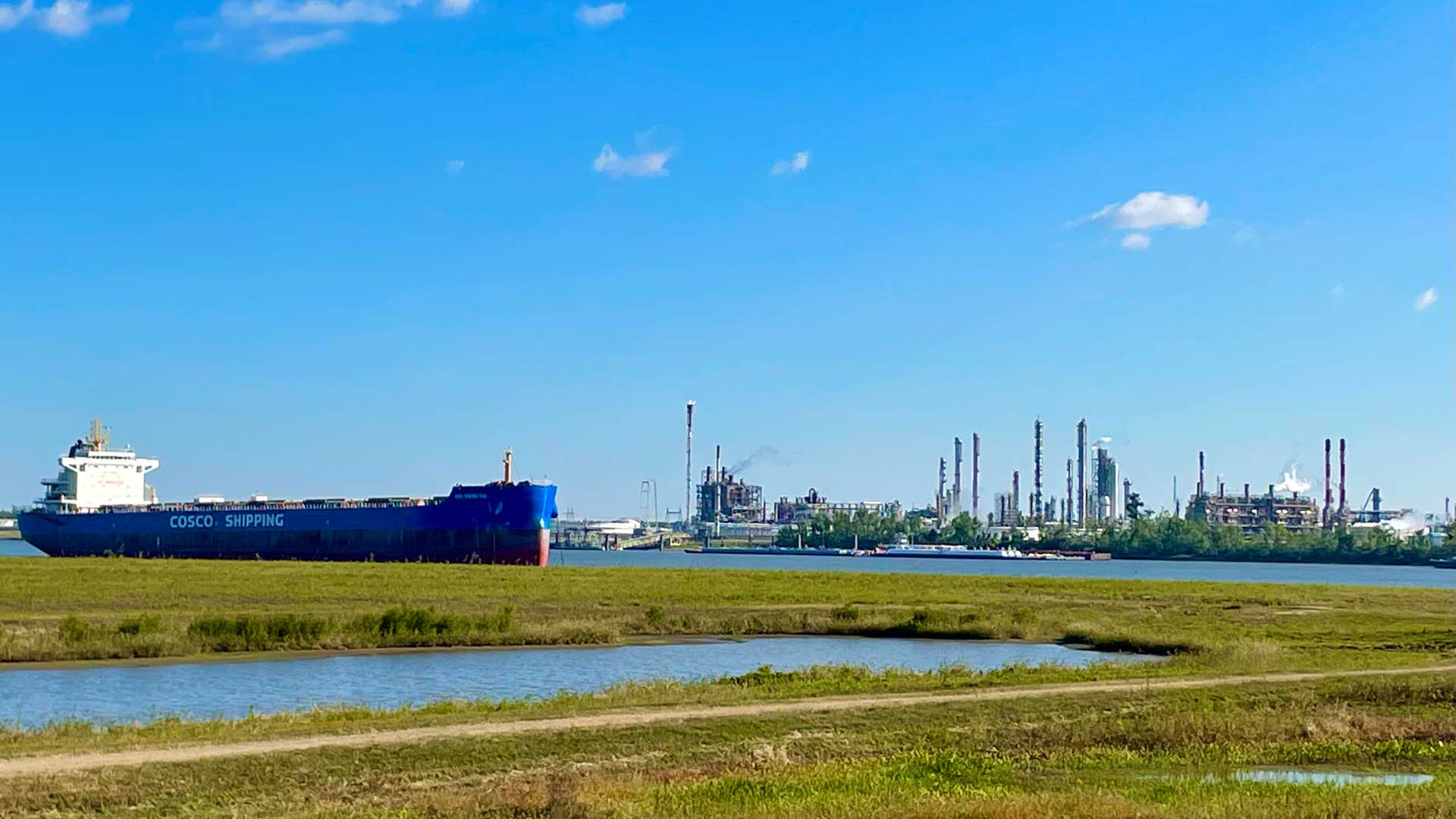
The Sacrament of Reconciliation
TB: I don’t know what a “win” is anymore. We live in a political climate of winners and losers, of teams to root for and root against. Our economic system demands winners at the expense of losers. In the face of this, the idea of reconciliation becomes twisted.
Colloquially, we think of “reconciliation” as two antagonists hugging it out, saying “I love you, man,” and sharing a beer. Forgive and forget. Move on. This works in our win-and-lose system, because the winner keeps his gains, the loser saves face, and nothing really changes. But is this true reconciliation?
In the Catholic church, we have a sacrament that most folks think of simply as “confession,” but it’s actually called the “sacrament of reconciliation.” No doubt, confessing is at the heart of it, but that’s not all. Strip away the specific religion of the act, and the process is this: Search your mind and soul for an unvarnished assessment of your thoughts and actions and words. Admit to those that are harmful to yourself, to your relationship with the people and community around you. Then ask for help to make it right, to be better, to do better.
This process is removed from winning and losing, as the full scope of it requires acknowledging a community around you and a desire to move forward in community together. It recognizes that there is a greater good in togetherness, in communion. While I’m thinking of it in Catholic terms, it is little different than “the Beloved Community” as expressed by the Student Nonviolent Coordinating Committee’s Bernard Lafayette or the Rev. Dr. Martin Luther King Jr. You and I were lucky to have that discussion with Ainka Sanders in Selma a few years ago, at the Center for Nonviolence, and it’s a discussion that has kept ricocheting around inside my skull ever since.
But it is woefully difficult to apply this confession-centered and community-bound concept of reconciliation on the societal level. The body politic, manifested in social media, radio call-in shows, screaming-head “news” shows, is way more intimidating than a confessional. In the face of quick takes and quicker judgments, we want to withhold the most damning nugget of fact, file down the sharp edges, justify and defend the very thoughts and acts we’re trying to confess, divert attention to someone more culpable and distinguish ourselves from them, shift the blame. And when none of that works, we throw up our hands and ask why we must confess to wrongs committed by others, by Nazis in Charlottesville, Karens in community pools, Biffs in boardrooms, by the Klansmen and Confederates hanging in our family trees.
As Lou Reed once sang, “I guess that I just don’t know.” Reconciliation is a lot of trouble. Why go through with it? What good is achieved by the vulnerability to each other that such a process would require? As Americans, as Southerners, aren’t we taught that, of all the codes and causes, loyalty to our land and our history, to the idea of ourselves as perfected, is the greatest good?
What is salvation about, but redemption? People want to be delivered from loss. They want to avoid pain. Everyone is a sinner, we’re taught. But we’re supposed to be striving to be better. I don’t believe for a second that the South is uniquely bad. I don’t even believe it’s bad in the first place. I’m from here. Most of the people I love are from here. There’s something sacred in the fact of that.
MR: What is salvation about, but redemption? People want to be delivered from loss. They want to avoid pain. Everyone is a sinner, we’re taught. But we’re supposed to be striving to be better. I don’t believe for a second that the South is uniquely bad. I don’t even believe it’s bad in the first place. I’m from here. Most of the people I love are from here. There’s something sacred in the fact of that.
To live anywhere on Earth is to live upon scarred land. Scars don’t disappear. We feel them even when we can’t see them. We must account for those marks even when that’s difficult.
America has become a team sport. Most of us are tired, angry, confused. But I’m not asking anyone to clutch their chests and fall to their knees. I’m asking people to be mindful of the scars.
There’s been all this discussion about whether the fight for human rights has gone too far. People are being called radical for wanting the lives they deserve — the lives others already take for granted.
When I consider the traffic stops, the incarceration, the theft of voting rights, the hoarding of opportunities, I consider that people like myself are not calling for a utopia. We’re calling for a cease-fire.
I know there are people who will never understand where I’m coming from and others who are opposed to the fact of my existence. My message to those folks is to go find a rocking chair and stay out of my way. But if you want to build something good, I’m here.
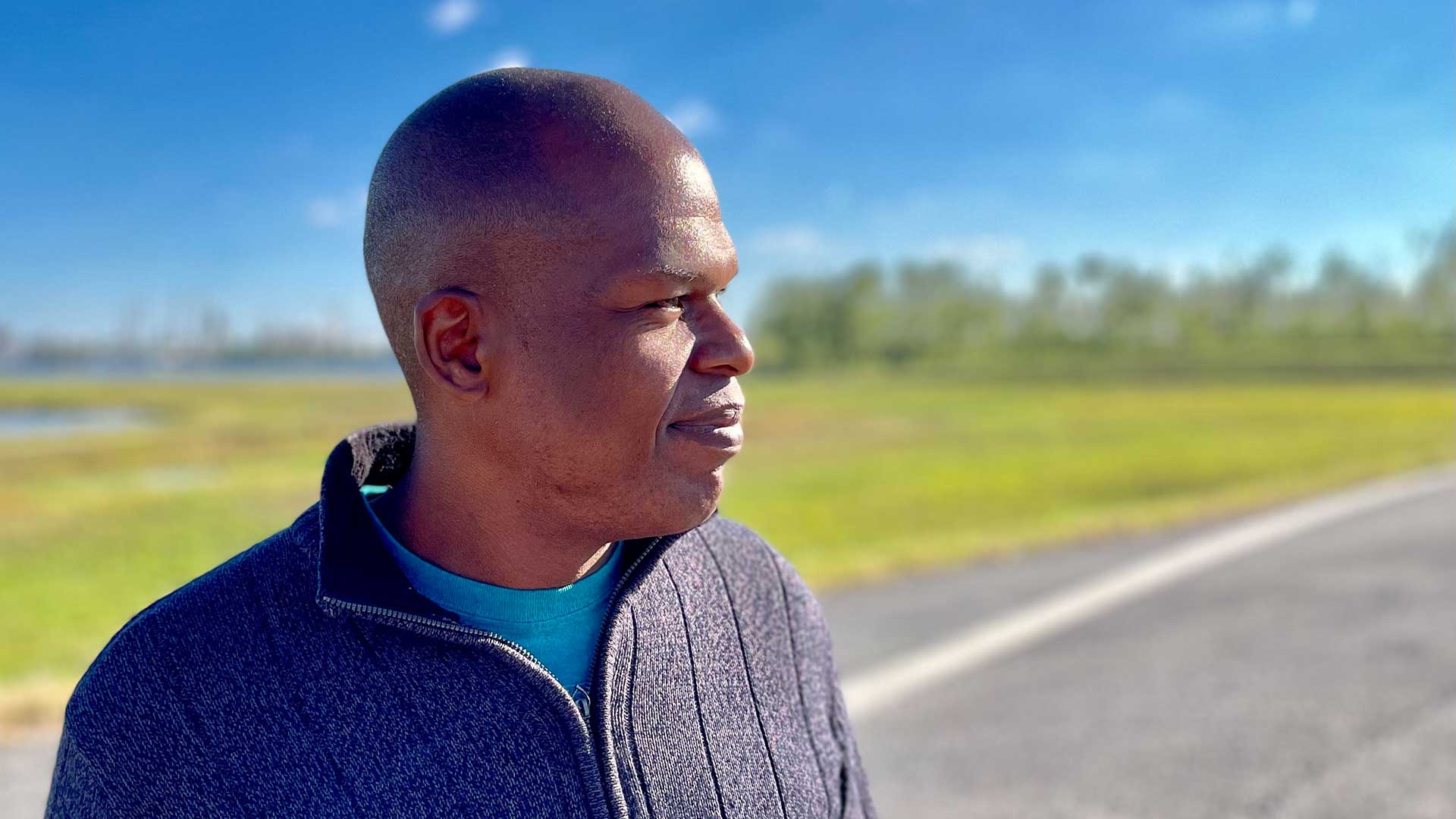
We Dream of an Endless Porch
TB: That rocking chair is problematic. What if too many take to their rocking chairs and sit this out? What if the butts in those chairs belong to people who wield power to either sustain things the way they are or to change them for the better? Maybe they ought not to be sitting down just yet. Of course, what they’re scared of, what they yell to the people when scaring up votes, is that someone is going to come take their rocking chairs away from them. They don’t stop to consider that we could all work together to build more rocking chairs. An endless porch.
That rocking chair is something best enjoyed in company, at the end of a hard day or a hard week, a proper drink in hand (I’ll have rye in my glass, what’ll you have in yours?). I know you only meant that rocking chair as a quick metaphor, but forgive me, Maurice, while I torture it a little while longer. I want nothing more than to sit in some rocking chairs with you.
In one version of the vision of you and me sitting there, it’s a back-porch confessional, where I spill out to you the various sins of racism and genocide committed by my ancestors (a great-great-great-great-great-great-great-great-grandfather who was the military commander of an early colony of Puritans, who was known for brutality in his treatment of the men, women, and children who lived in the nearby tribal villages; at least a couple great-great-great-grandparents who likely enslaved people); where I catalog the various things a young and foolish me did that got me into zero trouble but that would have resulted in my incarceration or death had my skin not been white (speeding away from a pursuing police cruiser and pulling up behind a gas station as he went past, to avoid a traffic ticket; getting caught by a store manager, shop-lifting cigarettes on a dare; these are but two examples of many, though I never brought an AR-15 to a protest and killed people with it); or where I concede to prejudicial fears that on occasion have made me cross to the other side of a street or check that my car doors are locked; or about how the spaces I move in have become increasingly whiter, with each step since I’ve left my hometown of Selma — a whiter college, a whiter graduate school, a whiter law school, and whiter and whiter law firms in my profession — and how painfully little I’ve done to try to change any of that.
If it were just you and me talking, I could maybe make it through the litany unscathed, but I’m conscious, Maurice, that we’re writing this for others to read, and already I want to lace the list with qualifications and caveats—more of my pre-Civil War ancestors didn’t enslave people than did; at the same time I was doing young and foolish petty crimes that my privilege helped me survive I was also marching and speaking out for racial justice, a true Hell-raiser; my deep prejudices have me keep a cautious eye on white people I pass on the sidewalks, too (especially the rich, preppy-looking ones); I do try to speak up for diversity and inclusiveness when I have any proximity to say-so in my professional life, even if it seems futile. See how quick I am to retreat into “not-all-white-people,” to dilute the reconciliation process, to make it about me instead of about us? That’s the grand Us, not just you and me. It shouldn’t be about me moving forward through this, but about all of us moving us all forward.
Regardless, you don’t need to pull up a rocking chair next to me for the performative bullshit of Tad’s Confession. I don’t believe I have the right to ask for absolution, nor do I presume that you are authorized to absolve me. Absolution isn’t what any of this should be about.
The confession must be by me and to me, but should not be about me. And if more and more folks go through the earnest, unqualified inventory of how we each got to this place, not for the selfish goal of having our personal guilt lifted for our own sake, but with the aim to simply identify facts from which to begin, then we can sit in those metaphorical rocking chairs on that metaphorical porch and have real, sincere discussions about how, as a community, we can move forward and do better. Or let’s be less metaphorical. I need to be open about the intergenerational wrongs in my lineage, about the privileges I have access to only by virtue of my whiteness, and open about the things I am personally in the wrong about, but not to perform my virtue — and not for you, Maurice — but for the ears and hearts of other white folks.
To tell them, “Look, here are my facts, and you need to hear me say that these things are wrong.” To say, “Let’s talk about what pro-life really is, and how ‘pro-life’ by definition cannot include spurning ‘Black Lives Matter,’ not unless you’re only pro-some-of-the-lives.” To accept into our hearts the radical kind of love that means we want to support the dignity of the lives of the people we neither understand nor agree with. The kind of radical love that says that neither of our lives, Maurice, is more important than the other.
So what can “reconciliation” be about when we seem to be surrounded by so much rejection of radical love? I’m tired, man, of seeing all the hate lived in the world, streamed direct to our eyeballs, fed into our twitter feeds. And if I’m tired, I know it’s nothing, Maurice, compared to how tired you must be.
So why this reconciliation? Why my confessions? It’s so easy to state my truths in value-laden and judgment-casting terms, but instead the struggle is to just find, acknowledge, and state bedrock facts. Like reconciling a checkbook—verifying the facts of the money that comes in and the money that goes out, the assets and the liabilities, and making sure the balance is on the plus-side at the end of the day.
I get it. Facts are difficult. Sometimes they’re hard to verify. Sometimes they hide from us. And sometimes, knowing the facts and admitting to them makes us vulnerable. But there is only vulnerability if we’re concerned with our individual winning or losing. What if we could all just walk off the field, go sit in our metaphorical rocking chairs, and agree that none of us are going to win or lose in life, but that we’re just going to live it, together? That’s vulnerability that leads to communal strength, not individual diminishment.
Sometimes being Black feels like being a red sports car. Do you know what I’m saying? The idea that the highway patrol will pull over a red sports car going at a legal speed, but ignore the people in gray sedans swerving across the centerline. It’s a hard thing to live in a world where your paint job makes you a target.
While we were driving up River Road, the problems going by out the car windows could be overwhelming. Not only were we driving past historical, institutional racism underlying everything (the plantation houses and all they represent), but we were driving by pollution and the over-exploitation of Earth’s resources (the petrochemical facilities), economic inequality and poverty (the fancy neighborhoods and the rusting trailer homes), climate-change-driven doom (the ever-increasing need for the opening of that spillway, as each year’s rains fill the river higher and more frequently), and the very immediate problems of recovery from a devastating natural disaster (all the physical and financial damage from Hurricane Ida). It’s tempting to put the more systemic issues aside, because they are essentially in the background of everything, and surrender to only trying to fix the immediate problems. Isn’t that the lesson the political talking heads are saying that Democrats should have learned from the recent governor’s election in Virginia? That Democrats talk too much about racial inequality and justice issues and not enough about crumbling schools? That people don’t want to hear about how they’re complicit in the ills of the world?
But to see all that we saw on our drive, we only needed to drive the one road. That one road runs through all of it. There’s a entire world of pains and troubles outside the car windows. Closing my eyes to it won’t help, especially when I’m the one driving the car. But if we see it together, name it, then together we can step out of the car and confront it, walk a land worth being loyal to.
MR: Tired, you say? Yes. I suppose I am a bit threadbare. The recent events are always echoes of past events. Kyle Rittenhouse’s acquittal reminds me of the ranchers out west who refused to pay taxes on their cattle or the guys in the northwest who took over a federal post without consequence. Let a Black person try that.
Sometimes being Black feels like being a red sports car. Do you know what I’m saying? The idea that the highway patrol will pull over a red sports car going at a legal speed, but ignore the people in gray sedans swerving across the centerline.
It’s a hard thing to live in a world where your paint job makes you a target. But it’s not like I haven’t had targets of my own. What does it mean to want to improve the world while wearing a bullseye? What does it mean to want to help when you have so many blind spots?
It’s easy for me to point fingers. There’s plenty of wrong in the world. But I know that I have plenty of work to do, too. I always have and I may always will. Like a lot of people, I’ve learned a lot about myself while watching, for example, the fight for marriage equality. I’ve spent my whole life as an other. But I’m a cisgender, straight male. I’m not the other kind of other. And I remember hearing about people asking for the right to marry others of the same sex and thinking, “I guess” or “That’s not really my fight.” When I should have been loving, I shrugged my shoulders.
I’ve never encountered anyone who would admit that they were racist. But I’ve encountered plenty of people who showed indifference to my rights, my life. The policeman who pulled me over in my own driveway probably wasn’t a Klansman. But he also probably never considered the effect his actions would have on me or others like me.
When I should have been working on behalf of marriage equality or kids in cages or the death of our planet, I was writing essays like this. I’m not a protester by nature. You wouldn’t have seen me in front of a courthouse with a placard. But I am a writer. I could have said more than I did.
I was held back by fear. I didn’t think I was ready. I figured I would embarrass myself. And maybe those were reasonable fears, but that doesn’t mean I did the right thing.
Now, when I write — or for that matter read — I do it in service of being better than I was last year or five years ago. Salvation is not a destination. It is a road. I’m taking steps and hoping that others aren’t too afraid to step as well.
If you'd like to write a response to — or an amplification of — this story, all you need to do is hit the Submissions button below. This is how civil conversation works.

